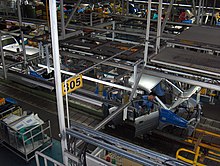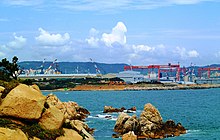
South Korea's major export industries include semiconductors, automobiles, and shipbuilding. Other major industries in South Korea are electronics, telecommunications, chemicals, and steel.

The country's manufacturing output is the sixth highest in the world. Well-known Korean manufacturing and tech companies include Hyundai Motors, Samsung Electronics, LG Electronics, Kia, SK Hynix, Celltrion, Posco, Krafton, Hancom, and NCSoft.
Steel
Main article: Steel industry in South KoreaThe steel industry plays a key role in the South Korean economy as it is the material for major industries such as automobiles, shipbuilding, and construction. In South Korea, the steel industry's GDP is 1.5 percent of all industries, and 4.9 percent of the manufacturing industry. In 2016, steel exports were $27.7 billion and imports were $19.4 billion.
As of 2021, POSCO was the world's seventh largest producer of steel. Hyundai Steel was the world's 18th largest producer of steel.
Major South Korean steel companies include:
Shipbuilding
Global Orders of Large LNG Carriers (2022)
Won by South Korea (70%) Won by other countries (30%)The South Korean shipbuilding industry holds the world's largest market share, winning 58% of the orders for high value-added ships orders and 70% of large LNG carriers ordered in 2022. Also the country's shipbuilders accounted for 62% of the world's orders, according to an October 2023 survey. Even in the eco-friendly ship market, the country has won more than 50% of the world's 26.06 million CGT orders. The country won 54% of the orders for LNG-powered ships.
Major South Korean shipbuilding companies include:
Shipping
Busan Port in southern South Korean city, Busan, is the world's sixth largest container port. Hyundai Merchant Marine remains eighth in the world with a 3.1% share in the global container market.
Major South Korean shipping companies include:
Biotechnology and pharmaceutics
See also: List of pharmaceutical companiesIn the South Korean pharmaceutical industry, exports of finished products, pharmaceutical substances, and technology are steadily increasing. The total export of Korean drugs sold in 188 countries in 2016 was $3.12 billion, an increase of 6% compared to 2015. In 2017 alone, eight technology transfers were made, with $1.23 billion in technology exports.
| Country | Raw metrial | Finished products | Total |
|---|---|---|---|
| 304,626 | 158,180 | 462,860 | |
| 28 | 397,830 | 397,858 | |
| 228,835 | 2,771 | 231,606 | |
| 95,938 | 112,084 | 208,022 | |
| 23,472 | 158,980 | 182,452 | |
| 374 | 134,660 | 135,034 | |
| 86,215 | 30,065 | 116,280 | |
| 18,386 | 94,873 | 113,259 | |
| 60,804 | 20,167 | 80,972 | |
| 54,769 | 22,073 | 76,841 | |
| Others | 535,624 | 579,643 | 1,115,267 |
| Total | 1,409,072 | 1,711,325 | 3,120,397 |
South Korea is a global biopharmaceutical powerhouse with human resources and infrastructure equipped with clinical research capabilities and IT platforms. Korea ranks fourth in biopharmaceutical technology after the United States, the EU, and Japan.
President Yoon Suk Yeol announced goal to raise the production volume of the bio industry to 200 trillion won by 2035.
Oil and gas and petrochemical
The petrochemical industry is a key industry that plays an important role and export, accounting for 6.1% of South Korea's total manufacturing production, 4.4% of added value, and 8.2% of exports.
South Korean petrochemical companies raised their forecast for Ethylene production capacity in 2018 to 14.03 million tons by 2023 through a series of investment plans based on their positive performance in recent years to maintain their competitiveness in the global market.
Major South Korean petrochemicals companies include:
Oil refining
South Korea is the fifth-largest country with refining capacity, capable of refining almost 3.6 million barrels of oil a day as of 2021. The country produces a wide range of petrochemicals, from fuel oil to lubricating oil, and has several large petrochemical companies.
Major Sohth Korean oil refining companies include:
Motor vehicles and machinery
Main article: Automotive industry in South Korea See also: List of automobile manufacturers of South Korea and Category:Auto parts suppliers of South Korea

The Korean automobile industry produced 3.51 million units in 2020, ranking fifth in the world after China, the United States, Japan, and Germany. In addition to automobile production, parts, materials, sales, repair, and service utilization play a pivotal role in the South Korean economy.
South Korea's major global automakers are Hyundai Motor, Kia and Genesis, one of the world's three largest automakers in terms of sales.
The auto parts industry is also important to South Korea, with nine South Korean companies listed on the list of the top 100 auto parts companies based on sales in 2020.
Major South Korean auto parts makers include:
- Hyundai Mobis
- Hyundai Transys
- Hyundai Wia
- Hanson Systems
- Mando
- SL
- Yura Corporation
- Seoyon E-Hwa
- Hyundai Kefico
Aerospace
See also: Korea Aerospace Industries, Defense industry of South Korea, Korea Aerospace Research Institute, and Korea AeroSpace Administration Further information: Category:Aircraft manufacturers of South Korea

Korea Aerospace Research Institute, KARI, developed the first-stage solid-propelled science rocket (KARI KSR-1, 1993), the second-stage solid-propelled medium-sized science rocket (KARI KSR-2, 1998) and the liquid-propelled science rocket (KARI KSR-3, 2002). It developed the Naro space launch vehicle, which was successful in launching in 2013, and gained know-how and experience in space launch vehicles. Currently, South Korea has developed a three-stage Korean rocket (Nuri) and launched a 1.5-ton application satellite at an altitude of about 600-800 kilometers into solar synchronous orbit. With the development of the Nuri space rocket, South Korea has finally secured three elements of space development: a satellite, a projectile, and a launch site.
Semiconductor
Main article: Semiconductor industry in South KoreaAs of 2022, South Korea accounted for 60.5% of the global memory semiconductor market, with a DRAM market share of 70.5% and a NAND market share of 52.6%. South Korea is continuously focusing on R&D and investment to maintain its competitive advantage. In addition, South Korea is pushing to expand its foundry market share based on ultra-fine processing technology. The country accounts for 17.3% of the global foundry market.
Global memory semiconductor market share (2022)
South Korea (60.5%) other countries (39.5%)Global DRAM market share (2022)
South Korea (70.5%) other countries (29.5%)Global NAND market share (2022)
South Korea (52.6%) other countries (47.4%)Major South Korean semiconductor companies include:
Electronics
Main articles: Electronics industry in South Korea and South Korean robotics Further information: Home appliance manufacturers of South Korea, Category:Manufacturing companies based in Busan, and Category:Manufacturing companies based in Seoul See also: Mobile phone industry in South Korea

In terms of industry share in South Korea's exports in 2015, electronics, including semiconductors, wireless communication devices, flat panel displays, computers, and home appliances, topped the list with 27.6 percent, followed by automobiles and auto parts with 13.5 percent.
LG ranked first in the OLED TV market in the first quarter of 2023, accounting for about 60% of the total shipments. The LG OLED TV is currently sold in more than 130 countries, making it the most widely available OLED TV in the world.
Many of the world's major electronics companies are based in South Korea, includes:
See also
- Economy of South Korea
- List of companies of South Korea
- South Korean robotics
- Science and technology in South Korea
- List of Korean inventions and discoveries
- International rankings of South Korea
References
- "South Korea". OEC.
- "Emerging Markets: Analyzing South Korea's GDP". Investopedia. September 18, 2022.
- "Manufacturing, value added (current US$) | Data". data.worldbank.org. Retrieved 17 March 2020.
- "Position in the Korean economy". Korea Iron & Steel Association.
- "Top steel-producing companies 2022/2021". World Steel Association.
- "Shipbuliding & Marine". Invest Korea.
- "Shipbuliding & Marine". Invest Korea.
- "Shipbuilding industry in South Korea stands strong on global footing". Asia Fund Managers. December 19, 2023.
- "A Quick Guide To South Korea's Maritime Industry". Maritime Fairtrade. February 17, 2021.
- "Korea, the new maritime, economic and cultural hub". PierNext. May 17, 2023.
- ^ "Industry Overview". Korea Pharmaceutical and Bio-Pharma Manufacturers Association.
- "Yoon vows to expand bio industry production size to 200 tln won by 2035". Yonhap News. March 26, 2024.
- ^ "[Chemicals] Status and Prospects of Korea's Petrochemical Industry". Invest Korea. October 23, 2019.
- "5 Countries With The Largest Refining Capacity". Insider Monkey. January 29, 2023.
- "Korea's Automobile Industry and the Development of EVs and Self-Driving Vehicles". Invest Korea. May 1, 2022.
- "Hyundai becomes world's third-largest carmaker". The Korea Herald. March 15, 2023.
- "Nine Korean auto parts makers make the Top 100 list". Korea JoongAng Daily. August 11, 2021.
- "Nuri, the Korea launch vehicle". KARI.
- "The Development of Korea's Electronics Industry During Its Formative Years (1966-1979)". K-DEVELOPEDIA.
- "BACKED BY A DECADE OF INNOVATION: LG RANKS FIRST IN GLOBAL OLED TV MARKET". CISION. May 31, 2023.
| Economy of South Korea | |
|---|---|
| History | |
| Currency | |
| Industry | |
| Labor | |
| Energy | |
| Finance | |
| Free Trade Agreements | |
| Government agencies | |
| Organizations | |
| Related topics | |
| See also: Economy of North Korea | |